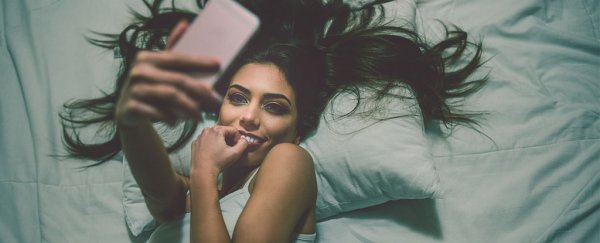Every day when we go online we are bombarded by sexy selfies. From pouting duck lips to emoji underwear, sexualised social media posts are on the rise in many parts of the world.
But while many assume that sexualised portrayals of women are a product of gender inequality or oppression, the truth could have more to do with female competition and advancement.
A new study has found that female sexualisation is not, in fact, linked to a culture of female oppression - where women are treated, and treat themselves, as sexual objects.
Instead, it appears that women could actually be subconsciously using their sexuality as a strategy against income inequality.
"So, when a young woman – perhaps your own daughter – adjusts her bikini provocatively with her phone at the ready, she probably isn't worrying about succumbing to the patriarchy," says co-author Khandis Blake, a gender psychologist at the University of New South Wales in Australia.
"Our sexy selfies research, including in-depth case studies in the lab, suggests she is probably feeling empowered, assertive and in control."
Pulling together more than 68,000 sexy selfies from Twitter and Instagram, the researchers pinpointed the geographic locations for each picture. The researchers then gathered data on gender-inequality and income-inequality in the 5,567 US cities and 1,622 US counties identified.
Contrary to the initial hypothesis, the findings revealed that sexy selfies weren't actually associated with regions with gender inequality.
But they did appear to be linked to gender income inequality. Where there was more income inequality between men and women, women were more likely to post sexualised content.
Additionally, the researchers gathered sales data on beauty salons and women's clothing in areas that were economically unequal but not gender oppressive.
It was found that these areas had relatively higher sales in goods and services related to female appearance.
As such, the authors suggest that sexy selfies and appearance enhancement are markers of high female competition.
"Psychology tells us that economic inequality highlights an individual's relative social position, stoking status anxiety among people on every level of the social hierarchy. Inequality also provokes and intensifies competition," explains Blake.
With beauty being a valuable commodity in our society, it's no surprise that women might use it to their advantage when competition heats up.
In evolutionary terms, the authors say sexualisation "may be a marker of social climbing among women", who are keeping tabs on the local "competition".
Even on an international scale this appears to be true. The researchers have found similar results tracking social media posts across 113 nations.
"So far, our results suggest that women are more likely to invest time and effort into posting sexy selfies online in places where economic inequality is rising – in developed nations such as the US and Singapore, for example, where steady gains in the empowerment of women have coincided with widening gaps between the haves and the have-nots," says Blake.
Far from being a self-obsessed, narcissistic act, the researchers suggest that appearance may be one way for women to improve their lives in environments where few other avenues exist.
"Telling young women to stop posting sexy selfies is like asking them to forgo the pot of capital that youth bestows on them, even though they know its value diminishes with time," argues Blake.
The study has been published in PNAS.
